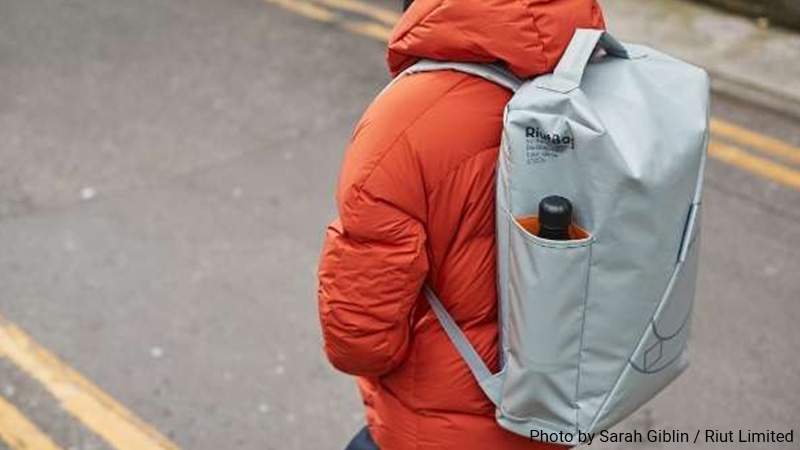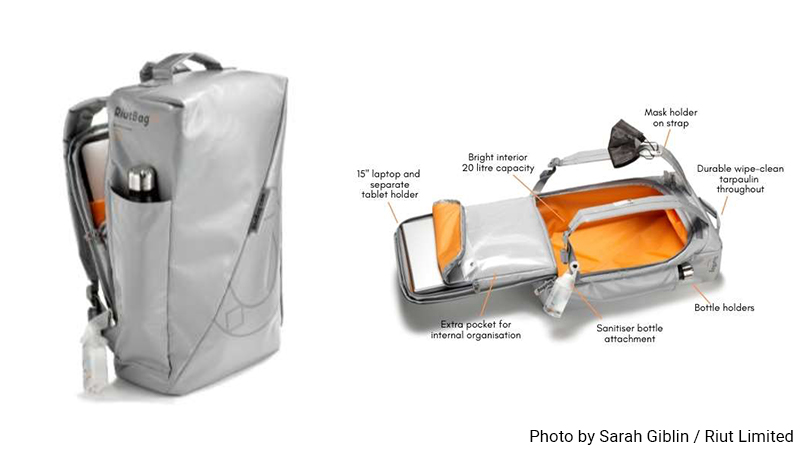Riut Survives the Pandemic — and Reinvents the Backpack
Many startups begin with just an idea to change the world in some small way.
When Sarah Giblin started Riut, a company that makes backpacks, all she had was an idea. Specifically, a simple idea to prevent thieves from stealing people’s stuff out of their bags. At the time, no other bag was designed in the way she had in mind, which meant the potential market was huge. So, she left her job, withdrew her life savings, and set out on a mission to reinvent the backpack.
“I remember when I started the company. I thought to myself, ‘what is going to kill my product?’” she says. “I was in a booming travel market with more people living in cities every year [and] with more people across the world accessing technology and moving. I couldn’t see how that would change any time soon. The thing I thought would defeat the backpack was the future invention of teleportation.”
That was in November 2020. And while teleportation never materialized, a new virus did. The subsequent worldwide lockdowns and travel bans nearly killed Giblin’s business in its infancy.

Is That Stranger Trying to Rob Me?
Giblin’s story began in 2012 during her daily commutes in England and weekly flights between London and Berlin. Giblin recalls the day that started it all. “I noticed so much stress, annoyance, and so many microaggressions between strangers on those journeys.” At one point, a stranger ahead in line all but accused her of trying to steal something from his backpack. Then she felt someone brush against her from behind. Could they be trying to swipe her passport?
“But then I stopped. The guy in front of me thinks I might steal something from his backpack, but I’m not doing that — I’m actually too busy worrying that someone is taking something from my backpack,” she says. “And I suddenly imagined this never-ending line of people in cities with backpacks on, all worrying what the person behind them was taking. So, I thought, couldn’t we save all this suspicion by just removing all the zips from the outside of backpacks and putting them against your back instead?”
Giblin tried for a year to find such a backpack, but it simply didn’t exist. So, she came up with a few product sketches and showed them to her friends. They were much more enthusiastic than they had been about previous “hair-brained ideas” of hers, and starting a company seemed like it might actually be a possibility. “That future — one where I try to work out how to make this idea a reality for hundreds, thousands, or more travelers around the world — suddenly became a future I wanted to make happen.”
Her first step was to work with a prototyping company and survey city travelers to find out what exactly they carried in their backpacks. She built her first prototype – called a RiutBag – based on this feedback, along with input from people on social media. Then it was on to Kickstarter, where she crowdfunded the first production RiutBag and found her first 1,000 customers. Gilbert claims that “from that point onwards, I’ve been designing, manufacturing, rebuilding RiutBags and exploring what you can do when you turn backpacks the opposite way round.”

Down, but Not Out, in the Pandemic
Unfortunately for Giblin, she picked just about the worst possible time to start a company – right before COVID-19 basically shut down worldwide travel and everyone’s commutes. “As soon as the first lockdown was called, the orders stopped,” she says. “Being a backpack designer in a global travel ban is not something I would recommend.”
Still, she persevered, hunkering down in her studio apartment in Manchester for most of 2020. Things had never looked bleaker, but then out of the blue, she got a message from one of her customers: a doctor in Mexico. Essential workers like him were the only people still commuting, and he had a problem: his hospital wouldn’t let him take his RiutBag (made of Cordura nylon) because it couldn’t be sanitized. He needed a solution, and she needed healthcare workers — some of the few people in the world who were actually commuting – to be able to use her products.
That experience eventually inspired the RiutBag+, a version of the RiutBag made of a different material that can be wiped clean in seconds. “My business was not in a good shape, and neither was I,” she says. “But my incredible RiutBag users supported me and helped to fund the RiutBag+. Now doctors, nurses, health workers, teachers, and dentists — those key workers who couldn’t stop during 2020 — are using the RiutBag+ in 40 countries around the world.”

Competitors, Copycats, and Transitions
COVID-19 isn’t the only challenge Giblin has faced. There’s also her company’s size; she’s basically a one-woman show in a global travel industry dominated by massive companies with extensive research and development budgets, sales forces, and economies of scale. To compete, she has to make a product that’s both unique and compelling.
This task is made more difficult by the inevitable copycats. “When I started out, I knew the RiutBag would be copied and tried to prepare for that moment,” she said. “But when it came, I found it hard. It distracted me, and I lost my focus. Instead, I started trying to compete with these huge companies.” For a small business, that’s almost always a losing proposition. “Just don’t do it. Run your race. I’ve learned that the hard way over the years.”
Another challenge has been transitioning away from being a startup. “I was still acting like I was in survival mode, when in fact I had arrived at a new phase,” she says. “Starting a company is like jumping off a cliff. To prevent yourself from crashing on the rocks below, you have to build a plane out of nothing, and just as you near the rocks, you have to somehow make it fly. Then, of course, you have to keep this thing flying and fuel it somehow. But that initial phase — calling on all your ingenuity, fast-thinking, and most basic instincts — is very different from piloting a plane and keeping it flying smoothly and looking out ahead.”
Customer Feedback Is Key
Today, Giblin has about 20,000 customers around the world. Her company’s mission is to take a little bit of the stress out of travel, whether you’re commuting across town or hopping across continents. Riut (pronounced “riot”) stands for “Revolution in User Thinking” — a motto that drives everything she does.
“The process of listening to my customers and designing to solve the real-world problems they have is how I operate,” she says. “I revolve my thinking around the user. Users build their thinking into my designs through feedback.”
Besides the zipper configuration, Riut’s backpacks stand out in several other ways. For one, the bags are expandable from about 15 to 35 liters. This means by quickly adjusting a couple of straps and buckles, you can tailor the backpack’s capacity to match what you need to carry. Other key features include waist and chest straps, several interior and exterior pockets of various sizes, a cushioned compartment that holds up to a 15.6-inch laptop, a contrasting interior color so you can see the contents easily, and durable, washable, waterproof materials.

But, the primary reason for the RiutBag’s existence is the fact that all of the zippers sit against your back, which prevents pickpockets and means you don’t have to keep your head on a swivel in subway stations or other crowded areas. “It’s my aim to use simple changes in design to help you feel calm, secure, and confident carrying anything anywhere,” Giblin says. “When you combine the correct design with a challenging environment, people can lower stress levels and, instead, adapt and thrive there.”
Test Your Ideas and Rely on Your Experiences
Giblin advises aspiring entrepreneurs to really think about their ideas to see if, just maybe, one of them could be the foundation of a company. “Test your ideas in your mind,” she says. “Take them to their extremes, and see if they still work. Think about what would happen if everyone in the world used that idea. Would it be a better place?” That’s what she did, and it paid off. “I never thought I’d be a backpack designer. I’m just someone who spotted a problem and kept up with a simple solution. And, it was the right time in my life to take a risk and make it happen.”
She also says it’s important to rely on past work experiences, even if they’re not obviously relevant to the venture you’re contemplating. “My office job before I set up Riut was super helpful. It taught me how companies work and how they can be dysfunctional.” Life experiences were invaluable, too. “Every job and every experience I’ve had has helped me create my company and run it the way I do — especially in that vital startup phase where you’re scrambling to find the resources within yourself to make your place and get it flying. When the right idea comes along, save up, make a plan, and do it.”
About the Author

Mariliana has an MSC in Consumer Analytics and Business Strategy. She has a special interest in fast-moving industries and Big Data.
Startup Resources
- Learn more about Startups
- Visit the TRUiC Business Name Generator
- Check out the TRUiC Logo Maker
- Read our Business Formation Services Review
- Find Startup Ideas
- Explore Business Resources
Form Your Startup
Ready to formally establish your startup? Click below to read our review of the best business formation services!
Best Business Formation Services